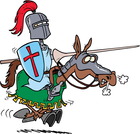
This lesson teaches children 3 rules on how they can stay safe as they navigate in the internet
- Subject:
- Elementary Education
- Material Type:
- Lesson Plan
- Author:
- Angie Nagle
- Date Added:
- 04/18/2019

This lesson teaches children 3 rules on how they can stay safe as they navigate in the internet
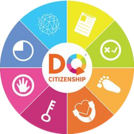
Students explore multiple forms of digital etiquette and citizenship. They research current events based around digital concerns and innovations. Eventually, they apply that knowledge to their own lives and use of technology to develop 5 top guidelines for digital device usage for their peers. Students share their presentations and projects in an exhibit-style venue. Using a survey, students vote for their top choices, eventually selecting one choice to implement.Standards:CCSS English Language Arts (Grade 8)Ohio Standards for Technology
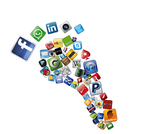
How will online posts affect your future?What impact does digital footprints have on scholarships, careers?Do businesses and companies look to people’s online presence when selecting employees to hire?
The information revolution of the 21st century is as significant and transformative as the industrial revolution of the 19th century. In this unit, students – and by proxy their families – will learn about the challenges of our current information landscape and how to navigate them. This unit is split into four modules. These modules can be done sequentially or stand on their own, depending on students’ needs and teachers’ timeframes. In this module (1 of 4), students analyze their own use of online social media platforms and learn how filter bubbles and confirmation bias shape the content of their media environment.

In Romanian universities, European Studies are traditionally focused on social and political sciences, economics, law or history, as well as international relations. Lately, EU aspects have increasingly been included in study areas that are not specifically related to the EU, and tailor-made courses on specific EU issues have been introduced that are relevant for graduates in their professional life.Unfortunately, only a few interdisciplinary modules have been developed over the last few years in Romanian universities. Therefore, West University of Timisoara (WUT) looks to the best ways of delivering the European dimension in all study programmes, by involving the use of new technologies and innovative teaching methods.Thus, the general aim of the proposed project is to integrate a short teaching programme about digital literacy (DL) into different European contexts, into curricula of different specialisations within WUT. The proposed module adopts innovative teaching methodologies based on Open Educational Practices (OEP), such as flipped classroom, MOOCs.
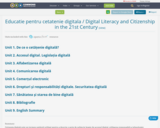
Cetățenia digitală este un termen umbrelă utilizat pentru a descrie o serie de subiecte legate de accesul digital, utilizarea responsabilă a tehnologiei, alfabetizarea digitală financiară, amprentele digitale și chiar bunăstarea fizică și psihologică. Este clar că cetățenia digitală se poate manifesta în mai multe feluri, fiind considerată și abordată variat/în alte moduri de către diferiți oameni. Ceea ce este însă important este recunoașterea faptului că, pentru a progresa în noua societate/economie digitală, avem nevoie de cunoștințe și competențe noi, bazate pe era digitală. Sperăm ca modulul propus vine în întâminarea tuturor formatorilor cu o abordare modernă, reușind să facă dintr-un proces de specializare tehnică o experiență dinamică, eficientă și relevantă, pentru formarea unor generații de cetățeni responsabili și activi.
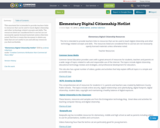
This annotated list is intended to provide teachers links to resources that can be used to teach digital citizenship and other technology related concepts and skills. The resources listed are considered free to use but are not necessarily openly licensed materials unless otherwise noted. Feel free to remix this document to delete any links that are not useful to you and add any resources you find worthwhile.
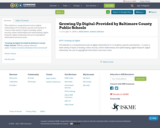
This website is a comprehensive look at digital citizenship for K-12 students, parents and teachers. It covers a wide variety of topics including: online security, online relationships and cyberbullying, digital footprint, digital citizenship, the use of copyrighted information and much more.
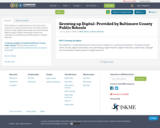
This website is a comprehensive set of resources for students K-12, parents and teachers. The topics include online security, digital relationships and cyberbullying, digital footprint, digital citizenship, student data, copyright and maintaining a healthy balance of digital exposure.
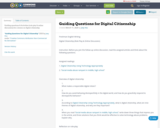
Guiding questions & Activities (role play & online discussion) for a lesson on digital citizenship
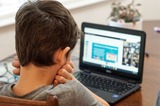
The inquiry helps students examine the responsibility of being a citizen both in the real world and the online world. In answering the compelling question “How is being a citizen online the same as being one in real life?” students will identify the attitudes and actions necessary to be a good citizen. The unit offers 12 lessons with formative performance tasks for educators to choose from depending on the age and needs of their students. Each provides students with opportunities to collect evidence and an understanding of how online behavior and boundaries are comparable to those necessary in the real world. At the end of the inquiry, students create an explanation and identify examples of the correlation between online and real life communities. Unit created by NCESD teachers: Sara Bedient, Sasha Dart, Brittany Jones, Krystina Nelson, Julia Spanjer, Keirstin Stansbury, Brittney Therriault

This collection of lessons represent adapted and remixed instructional content for teaching media literacy and specifically civic online reasoning through distance learning. These lessons take students through the steps necessary to source online content, verify evidence presented, and corroborate claims with other sources.
The original lesson plans are the work of Stanford History Education Group, licensed under CC 4.0. Please refer to the full text lesson plans at Stanford History Education Group’s, Civic Online Reasoning Curriculum for specifics regarding background, research findings, and additional curriculum for teaching media literacy in the twenty-first century.
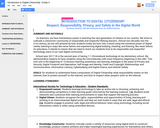
This unit is adapted from Common Sense Education's Digital Citizenship Curriculum for Grades 3-5 to include ideas on how to integrate education technology, using formative and summative assessment tools, such as Kahoot! and Socrative. There is also an example of how to use a QR code linked to AnswerGarden, another type of assessment tool.
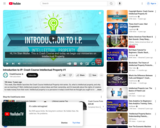
This week, Stan Muller launches the Crash Course Intellectual Property mini-series. So, what is intellectual property, and why are we teaching it? Well, intellectual property is about ideas and their ownership, and it's basically about the rights of creators to make money from their work. Intellectual property is so pervasive in today's world that we thought you ought to know a little bit about it. We're going to discuss the three major elements of IP: Copyright, Patents, and Trademarks.
ALSO, A DISCLAIMER:
The views expressed in this video do not necessarily reflect those of the United States Copyright Office, the Library of Congress, or the United States Government.
The information in this video is distributed on an "as-is" basis, without warranty. While precaution has been taken in the preparation of the video, the author shall not have any liability to any person or entity with respect to any loss or damage caused or alleged to be caused directly or indirectly by any information contained in the work.
This video is intended for educational purposes only and is not intended to be, nor should it be construed as, legal advice. Intellectual property law is notoriously fact-specific, and this video (or any other single resource) cannot substitute for expert guidance from qualified legal counsel. To obtain legal guidance relevant to your particular circumstances, you should consult a qualified lawyer properly licensed in your jurisdiction. You can contact your local bar association for assistance in finding such a lawyer in your area.
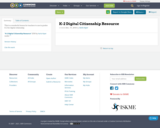
This is a wonderful lesson for teachers to use in grades K-2 for digital citizenship.
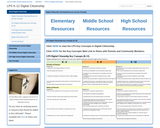
This is a collection of resources for teaching digital citizenship concepts to students K-12. Includes grade-specific key concepts, instructional materials, and talking points for teachers. Aligns digital citizenship instruction to specific pre-existing curriculum objectives whenever possible.

This unit engages students in a variety of activities that analyze and reflect on the role of social media in our everyday lives. This includes options for collaborative group work, reading nonfiction articles, a design challenge and presentations to communicate ideas. The unit also includes a formal writing assessment option that aligns with the Common Core State Writing Standards. Activities can be adapted or combined in a variety of ways to support student reflection and analysis. These lessons were piloted in 9th grade English classes but are suitable or a range of secondary students.
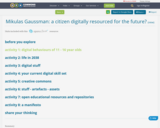
This resource offers the user 8 activities that encourage exploration/contemplation of:
• current UK educational practices in relation to digital literacy
• effects of digital literacy initiatives on UK’s global positioning in 2038
• educational movements that are supportive of global society concerns of sustainability.
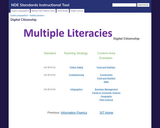
English Language/Arts > Multiple Literacies > Digital Citizenship

This lesson invites students to use multiple forms of media, including their own Instagram accounts, to explore their on-line identities. The lesson culminates in a personal, visual essay. In the essay, students will use their own images as evidence. Then, students will reason about that evidence to compare what they see on their Instagram posts to their “real world” self. Using information from resources explored in class, students will include a discussion of “authenticity” and properly weave in quotes from those resources.